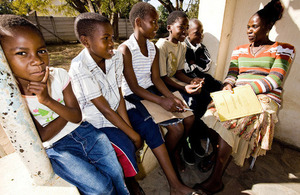DFID Research: HIV treatment in basic health facilities - fewer patients lost and quality of care maintained
A new Cochrane review highlights the health benefits of staying closer to home

Picture: Elizabeth Glaser/ Pediatric AIDS Foundation
Treating HIV patients in basic health facilities or at home means fewer patients drop out of treatment but the quality of care doesn’t suffer, a Cochrane review published this month shows. The review brought together the results of 16 studies, mostly conducted in countries in Africa and included both children and adults on antiretrovirals. The results found that treating patients closer to home rather than at a hospital, either at a basic health facility or in the community, resulted in more patients continuing on their treatment without compromising the quality of care they received, and was prepared by an international collaboration of scientists led by a team from South Africa. The review was carried out by people in the Effective Healthcare Research Consortium.
Starting HIV patients, and continuing patients, on treatment at peripheral clinics and in the communities is a new recommendation made by the World Health Organization (WHO) made in July, drawing on the results of this review.
The WHO recommends decentralisation of initiation and maintenance of ART to peripheral health centres, and maintenance of ART at community level between clinic visits.
says Eyerusalem Negussie from the WHO guideline development group.
The systematic review shows that decentralisation of ART to health centres and community level improves retention in care, and provides non inferiority comparable care compared to services provided at hospital level.
WHO have included this recommendation in their new consolidated HIV guidelines issued at the International Aids Society Conference in Kuala Lumpur, Malaysia. These guidelines go beyond recommendations for treatment and provide evidence on operations and service delivery.
Tamara Kredo from the South African Cochrane Centre and Folasade Adeniyi of the Centre for Evidence Based Health Care, Stellenbosch University; Professor Paul Garner from the Liverpool School of Tropical Medicine (LSTM) and Nathan Ford from Médecins Sans Frontières (MSF) carried out the Cochrane review of the current evidence to inform these guidelines. This was in collaboration with the Cochrane HIV/AIDS Review Group, based at the University of California, San Francisco.
The Cochrane Review process is widely recognised as the most rigorous way of collating the evidence to provide the necessary information to assist policy making. The review, Decentralising HIV treatment in lower- and middle-income countries, was published on 27 June and can be accessed via The Cochrane Library.